Muslim
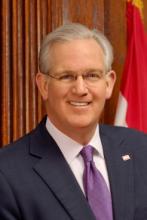
Missouri Gov. Jay Nixon has vetoed a bill that would have made his state the seventh in the nation to prohibit judges from considering Shariah, or Islamic law, and other “foreign laws” in their decisions.
But rather than citing the usual arguments about anti-Muslim discrimination and the freedom of religion, Nixon introduced a new argument against such legislation, asserting it would make it harder for Missouri families to adopt children from overseas.
Nixon said if state judges would not be able to consider foreign decrees that are sometimes required to finalize adoptions, adoptive families and children would be left stranded.
LIKE MANY Palestinians forced from their homes during the 1948 war, relatives of Jordan’s Sen. Haifa Najjar carried the keys to their Palestinian homes with them as they fled. These keys, passed down through generations, are powerful symbols of Palestinian ties to the land that international law considers theirs—even as their hope for return wanes.
As a Christian appointed by King Abdullah II to Jordan’s upper house of Parliament, Najjar is active in the education, environment, cultural, and legal sectors of the government. She is also superintendent of the Anglican-run Ahliyyah School for Girls and Bishop’s School for Boys in Amman, Jordan.
Within the mix of the 500,000 Palestinians who relocated to Jordan because of the Israeli War of Independence—or Nakba, “the catastrophe,” depending on who you ask—was a vocal minority of Palestinian Christians who joined their ranks with the existing Jordanian Christian community. Prior to 1948, Christians accounted for nearly 20 percent of the population of what is now Israel/Palestine. Today that figure is less than 2 percent. Even more dramatic are declines in the West Bank cities of Ramallah and Bethlehem. Christian populations are nearly extinct in these locations compared to their respective majorities of 90 and 80 percent prior to 1948.*
“They moved not as immigrants; they were initially thinking it was a temporary thing,” says Father Nabil Haddad of the Melkite Catholic Church in Amman. “It is similar to what Syrians are thinking right now when crossing the barbed wire, not the checkpoints, between south Syria and north Jordan.”
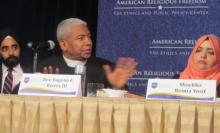
In a conference full of people who champion traditional religious values, Amardeep Singh knew that everyone might not appreciate his recounting of the “uncomfortable” cab ride he had taken the previous day.
Singh, a featured speaker at the second annual National Religious Freedom Conference in Washington on Thursday, told the several hundred attendees that his D.C. taxi driver had the radio tuned to a religiously minded commentator, who was explaining that women become lesbians because they had been abused.
His cab story — both his telling and the reaction to it — reveals fault lines in the coalition of Americans concerned that government and popular culture are eroding religious freedom and trying to banish religion from the public sphere.

CAMBRIDGE, Mass. — After two troubling outbursts at a local mosque, leaders there told Boston Marathon bombing suspect Tamerlan Tsarnaev he would no longer be welcome if he continued disrupting services.
Leaders at the Islamic Society of Boston‘s mosque in Cambridge say Tsarnaev, 26, who died early Friday after a shootout with police, “disagreed with the moderate American-Islamic theology” of the mosque, but they never had “any hint” the brothers might be violent.
On one occasion in November at weekly prayer, Tsarnaev challenged an imam who said in his sermon that it was appropriate to celebrate U.S. national holidays, such as July 4th and Thanksgiving, the statement said.
Tsarnaev argued that such celebrations are “not allowed in the faith.” When the preacher met with Tsarnaev after the prayer, Tsarnaev “repeatedly argued his viewpoint, and then left,” the statement said.
American Muslim leaders said they stand against terrorism committed in the name of Islam, trying to distance themselves from the suspects in the Boston Marathon bombings who were identified as Muslims with ties to Chechnya.
“We will never allow ourselves to be hijacked by this attempt, and we will not allow the perception to be that there is any religion in the world that condones the taking of innocent life,” said Nihad Awad, national executive director of the Council on American-Islamic Relations.
As the manhunt intensified in and around Boston, Muslim leaders convened a press conference Friday to denounce the attacks and to urge the media not to link their faith with violent extremism.

No sooner had the reality of the Boston Marathon bombing sunk in on Monday afternoon than Muslim activists in the U.S. began sending out a slew of news releases, tweets, and Facebook messages urging prayers and aid for the victims — and condemning whoever was behind the horrific attack.
“American Muslims, like Americans of all backgrounds, condemn in the strongest possible terms today’s cowardly bomb attack on participants and spectators of the Boston Marathon,” Nihad Awad, executive director of the Council on American-Islamic Relations said in a statement on Monday.
It’s a familiar race against time for Muslim groups. Almost as soon as the smoke cleared around Copley Square, they knew from long experience that some would immediately point the finger of blame in their direction.
Many widely believed Muslims were behind the 1995 Oklahoma City bombing, until American militiaman Timothy McVeigh was convicted of the crime.
“We also call for the swift apprehension and punishment of the perpetrators,” Awad added, echoing a statement from the Muslim Public Affairs Council that called on “all of us as Americans to work together to bring those responsible to justice.”
Rose Marie Berger writes in the May 2013 Sojourners magazine cover story, “For God So Loved the World,” that people of faith are key to reversing climate change. It will take a holy power shift to compel God’s people to care for creation and “launch an irresistible force for change.”
In creative and bold ways, people of faith from various religious traditions are doing just that. Together, they are raising their voices and taking action to address climate change.
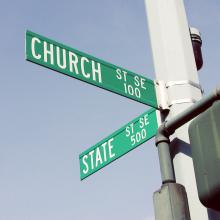
WILMINGTON, N.C. — A resolution to allow North Carolina to defy the Constitution and establish a state-sanctioned religion may be dead in the state capitol, but minority faiths say there’s more than enough reason to remain nervous.
Some worry about the implications the bill has for North Carolina, a majority Protestant state with growing Hindu, Muslim, and Buddhist populations.
Manzoor Cheema, a Raleigh resident and board member of the Triangle Interfaith Alliance, said he believes the resolution should be a wake-up call.
“I think this is a very disturbing development; very bad for our state. In my opinion, as a Muslim, a minority community member and immigrant from Pakistan, I believe that separation of church and state is fundamental and grants us many freedoms,” he said.
“But it’s a blessing in disguise to mobilize the interfaith community in North Carolina.”

Lego is defending its “Star Wars”-based Jabba the Hutt toy set after a Turkish cultural group said it promulgates negative stereotypes of Muslims.
Earlier this year, the Turkish Cultural Community of Austria criticized the Danish toy company, saying the Jabba’s Palace set was insensitive because of its similarity to Muslim mosques.
“The terrorist Jabba the Hutt likes to smoke a hookah and have his victims killed,” said the statement, reported by the Austrian Times. “It is clear that the ugly figure of Jabba and the whole scene smacks of racial prejudice and vulgar insinuations against Asians and Orientals as people with deceitful and criminal personalities.” Earlier this year, the Turkish Cultural Community of Austria criticized the Danish toy company, saying the Jabba’s Palace set was insensitive because of its similarity to Muslim mosques.
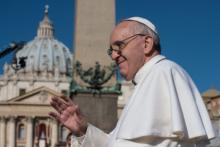
Pope Francis on Thursday washed the feet of 12 young inmates, including two girls and two Muslims, during a Maundy Thursday Mass at a youth detention center in Rome.
The Argentine pontiff, who has shown an eagerness to break with tradition in the two weeks since his election to the papacy on March 13, chose to celebrate the rite in the Casal del Marmo prison in northwest Rome, rather than in the traditional venue of the St. John Lateran Basilica.
Francis has repeatedly stated his desire to bring the papacy and the church closer to the poor and the marginalized.

On a summer night in a Western town of flat fields and hazy sunsets, a young woman stood outside a Greyhound bus with a ticket in her hand and a backpack over her shoulder. Boarding the bus, she said later, would be the hardest thing she had done in her 18 years.
Harder than saying a last goodbye to her mother, father, and five siblings that morning. Harder than the two years since as she tried to make a new life, alone, in a strange city.
Now 20, she asked to go by the name Samya. If her true identity were known, Samya believes, her family would seek her out and possibly kill her. They would certainly try to persuade her — if not force her — to come home.
Her parents, she said, think she is guilty of two serious crimes: She rejected a marriage arranged by her father, who came to the U.S. from the Middle East when Samya was an infant. And perhaps more serious to her parents: She has become an atheist.
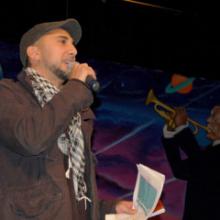
CHICAGO — Religious affiliation may be on the wane in America, a recent Pew study asserts, but you wouldn’t know it walking into the storefront near the corner of West 63rd Street and South Fairfield Avenue.
Inside a former bank in a neighborhood afflicted with gang violence, failed businesses and empty lots, a team of volunteers drawn by their religious faith is working to make life better for Chicago’s poorest residents.
The free medical clinic has expanded its hours; 20-something college graduates are clamoring to get into its internship program; rap stars swing by its alcohol-free poetry slams; and the budget has increased tenfold in the past decade.
The storefront belongs to Chicago’s Inner-City Muslim Action Network (IMAN) and it is part of a wave of new Muslim institutions emerging at an unprecedented pace. More than a quarter of the nation’s 2,106 mosques were founded in the last decade, according to a recent University of Kentucky study, and new social service organizations, many of them run by 20- and 30-something American-born Muslims, are thriving as never before.

Radical monotheism. It sounds like a frightening term, when there are fundamentalist Christians and Muslims around the world and here inside our own borders, religious folk who want to turn our nation-states into theocracies under gods crafted according to their own images. When we think of radical monotheism, we hear, “My god is bigger than your god. No, wait: Your god’s a fake!”
But theologian H. Richard Niebuhr proposed a kinder, gentler, more generous idea of radical monotheism. He was writing between the Korean and Vietnam wars, as the clash between two “social gods” — capitalism and Marxism — bloodied the globe:

Three Buddhists, a Hindu, and a “none” will walk into the 113th Congress, and it’s no joke. Rather, it’s a series of “firsts” that reflect the growing religious diversity of the country.
When the new Congress is sworn in next January, Hawaii Democrat Tulsi Gabbard, an Iraq war veteran, will represent the state’s 2nd Congressional District and will become the first Hindu in either chamber on Capitol Hill.
The 31-year-old Gabbard was born in American Samoa to a Catholic father and a Hindu mother, and moved to Hawaii as a child. She follows the Vaishnava branch of Hinduism, which venerates the deity Lord Vishnu and his primary incarnations.
Gabbard takes over the seat held by Rep. Mazie K. Hirono, who won a Senate race on Nov. 6 and will become the first Buddhist to sit in the upper chamber. There were already two other Buddhists in the House of Representatives, both of whom won re-election: Rep. Hank Johnson, a Georgia Democrat, and Rep. Colleen Hanabusa, a fellow Hawaii Democrat.

Congress will become a shade more religiously diverse this January, after Tuesday’s election of the first Hindu representative and first Buddhist senator.
Tulsi Gabbard, a Democrat from Hawaii, will become the first Hindu-American congresswoman, after defeating her Republican rival on Tuesday.
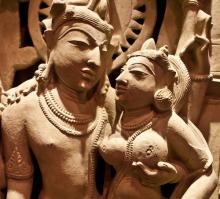
With their “True Love Waits” jewelry, conferences and T-shirts, Christians may be the face of the abstinence movement, but Muslims and Hindus are more likely to abstain from premarital sex.
That's the conclusion of a new study in the American Sociological Review, which also found that Muslims and Hindus -- at least in the developing world -- are more likely than Christians and Jews to refrain from extramarital sex.
“All major world religions discourage sex outside of marriage, but they are not all equally effective in shaping behavior,” said Amy Adamczyk of the John Jay College of Criminal Justice, who co-authored the study with John Jay doctoral student Brittany E. Hayes.
Drawing on the Demographic and Health Surveys funded by the U.S. Agency for International Development, the study included data from 31 developing nations collected between 2000 and 2008. The authors focused on individuals' responses to questions on religious affiliation, marital status, and sexual behavior outside of marriage.
Adamczyk said the study evolved from another study she was doing that found countries with large Muslim populations have very low rates of HIV and AIDS. "I was trying to figure out why that would be,” she said. One reason she considered was lower rates of sex outside of marriage.
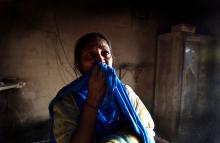
When the United States dropped atomic bombs on the Japanese cities of Hiroshima and Nagasaki in 1945, the world was ushered into a period of weapons paranoia. The Cold War, of course, was hallmarked by the obsessive weapons one-upmanship of the United States and the Soviet Union.
Who, then, would have thought that in the 21st century, the seeming weapon of choice would not be some sort of super-nuclear missile or an ultra-deadly biological toxin, but that it would, instead, be women?
“Women are being used as weapons of terror,” Dr. Rubina Greenwood told an audience last week at a congressional briefing on the rights of minority women in Pakistan organized by the Hindu American Foundation.
A possibly significant development in Muslim-Christian-Jewish relations is being spear-headed by the Islamic Scholars of North America (ISNA). In July of 2012, ISNA Director of Community Outreach, Dr. Mohamed Elsanousi, convened a small multilateral forum of scholars in Mauritania to discuss challenges faced by religious minorities in Muslim-majority communities around the world.
Mauritania is an interesting choice, since it has no indigenous Christian population, and the CIA World Factbook lists the country as “(official) 100% Muslim.”
So, officially, Mauritania is 100 percent Muslim, which begs the question: If the ISNA is reaching out to Islamic scholars in Mauritania on the issue of minority religious rights, and the (official) statistic is that Mauritania is 100 percent Muslim, is this a tacit recognition on ISNA’s part that some of the 100 percent officially Muslim Mauritanians have secretly switched their religion … and that international human rights standards should allow them to do so?
If that’s the case, then this is a significant development in interfaith relations.
… the key word being if.

Responding to attacks on Muslims, Sojourners has been placing ads around the country with a simple reminder of Jesus' command regarding how we treat others. The billboards and subway ads read: “Love Your Muslim Neighbors.”
Now, the attacks have reached our nation’s capital. Pamela Geller and the American Freedom Defense Initiative’s hateful ads that refer to Muslims as “savages” were placed in Washington, D.C., Metro stations this week following a lengthy court battle. Sojourners was ready for this development and has purchased “Love Your Muslim Neighbors” messages that will be going up in the some of the same Metro stations targeted by the American Freedom Defense Initiative and should appear by the 15th of October.
The ongoing attacks against religious minorities both in the United States and around the globe are saddening and disturbing. You can help respond to the latest developments in DC by clicking here.

TORONTO — The Canadian government is canceling the contracts of all non-Christian chaplains at federal prisons.
By next spring, Muslim, Jewish, Sikh and other non-Christian inmates will be expected to turn to Christian prison chaplains for religious counsel and guidance.
In an email to reporters on Oct. 4, the office of Public Safety Minister Vic Toews, who is responsible for Canada's federal penitentiaries, said the government "strongly supports the freedom of religion for all Canadians, including prisoners."